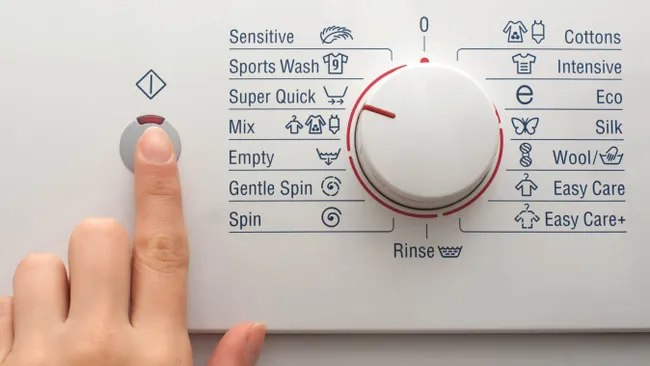ADVERTISEMENT
If you frequently use the quick wash cycle for large or heavily soiled loads, you may find yourself rewashing clothes to get them properly clean—defeating the whole purpose of the time-saving cycle.
4. Less Rinse Time Means Soap Residue
A typical quick wash cycle also shortens the rinse phase, which can result in soap and detergent residues being left on your clothes. This is especially problematic if you use a concentrated detergent or fabric softener. Residue buildup can irritate sensitive skin and cause a filmy feeling on your clothes. Plus, detergent residue can attract dirt, meaning that your clothes will get dirty faster after being washed, and you’ll end up washing them again.
When you use a regular wash cycle, the rinse phase is typically longer, which helps ensure that all the detergent and soap are thoroughly removed from your clothes. This leaves them feeling fresh and clean without any leftover residue.
5. Not Energy Efficient for Heavier Loads
Although the quick wash cycle uses less time, it doesn’t necessarily mean it’s the most energy-efficient option, especially for larger or dirtier loads. While it uses less water, the higher spin speeds and shorter wash times mean that your washer has to work harder during those few minutes. If you’re washing larger loads or heavily soiled items, the quick wash cycle can use up just as much—if not more—energy compared to a longer, more efficient wash cycle designed for heavy-duty cleaning.
Instead of opting for the quick wash cycle, consider choosing an eco-friendly or energy-efficient option with a longer wash time. These cycles are designed to clean effectively while using less water and energy, providing a better long-term solution for your laundry needs.
6. The Long-Term Costs of Frequent Quick Washes
Over time, the habit of relying on the quick wash cycle can lead to higher long-term costs. Frequent use of this cycle can shorten the lifespan of your clothes, as well as your washing machine. By constantly using a high-speed, high-agitation cycle, you may find yourself replacing worn-out clothes more often and needing repairs on your washer sooner than expected. Investing in a longer wash cycle can help protect both your clothes and your wallet in the long run.
When Should You Use the Quick Wash Cycle?
That being said, the quick wash cycle does have its place. It can be useful when you need to freshen up lightly worn clothes, when you’re in a hurry, or when you’re washing delicates that don’t require a heavy-duty cycle. The key is knowing when it’s appropriate and when it’s not.
If you’re washing something that’s not too dirty—like clothes that only need to be refreshed or lightly soiled items—the quick wash can work in a pinch. But for larger, dirtier, or more delicate items, it’s always better to take the extra time for a regular wash cycle.
Conclusion: Think Twice Before Using the Quick Wash Cycle
The quick wash cycle may seem like a convenient option when you’re short on time, but it’s important to understand its limitations. For better cleaning, longer-lasting clothes, and a more thorough wash, it’s best to avoid using the quick wash cycle regularly. Opting for a full cycle may take a bit more time, but it’s well worth the extra effort for cleaner, fresher clothes and a longer-lasting washer. Remember: when it comes to laundry, sometimes slower and steadier really does win the race.
ADVERTISEMENT
